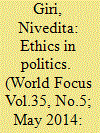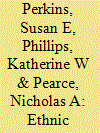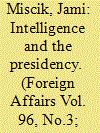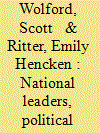| Srl | Item |
| 1 |
ID:
130822


|
|
|
|
|
| Publication |
2014.
|
| Summary/Abstract |
Till recently when India passed through its l6th general Elections, the election Commission of India appealed Indian citizens to select candidates and dump the criminals and the corrupt ones. It also urged the voters to sign a pledge to be ethical while casting their votes in the coming Lok Sabha elections. The Election Commission also appealed the voters to cast their votes without fear or greed, and without keeping caste, religion and creed consideration in mind. The commission's letter also stated that electing a candidate is not merely a citizen's right but his/her responsibility. Ethics and morality have been the hallmark of public life in India since ancient times. Rulers were expected to observe stricter ethical values. Ethics and politics, in other words, were inseparable. This ethical and moral legacy was inherited by its national leaders, who demonstrated a high degree of probity and honesty in public life during the freedom struggle. The early national leaders and political philosophers believed that politics without morality is a thing to be voided. However, in recent years there is a general feeling that all is not well with the Indian political system which is functioning under great strain. It has been noticed and concerns are being expressed over the general decline of values in public life. Recent trends in politics, however, appear to have created an impression as if, the capacity of Indian democratic system to ensure integrity in public life is increasingly going down.
|
|
|
|
|
|
|
|
|
|
|
|
|
|
|
|
| 2 |
ID:
127149


|
|
|
| 3 |
ID:
152585


|
|
|
|
|
| Summary/Abstract |
U.S. presidents and other senior policymakers often come into office knowing little about the 17 federal agencies and offices that make up the U.S. intelligence community, but in short order, they come to rely heavily on its unique technologies, tradecraft, and expert analysis. The intelligence community’s mission is to provide national leaders with the best and most timely information available on global affairs and national security issues—information that, in turn, can help those leaders achieve their foreign policy objectives.
|
|
|
|
|
|
|
|
|
|
|
|
|
|
|
|
| 4 |
ID:
148040


|
|
|
|
|
| Summary/Abstract |
States frequently form military coalitions, and these collaborations matter a great deal for international politics, yet their origins are poorly understood. Building coalitions in international crises improves military prospects. At the same time, it requires policy concessions to compensate partners. We show that a national leader’s job security affects her willingness to make this tradeoff. First, politically insecure leaders are more willing to form coalitions than secure leaders. The former face greater incentives to accept tradeoffs in order to bolster their chances of victory and thereby improve their chances of remaining in power. Second, politically insecure leaders are also less selective in their choice of partners. Their willingness to make larger policy concessions leads them to form coalitions with states of increasingly divergent foreign policy preferences. A sample of crises from 1951-1999 provides statistical support for these arguments.
|
|
|
|
|
|
|
|
|
|
|
|
|
|
|
|